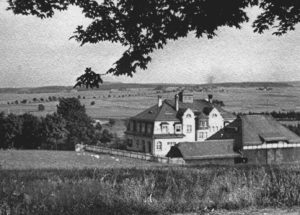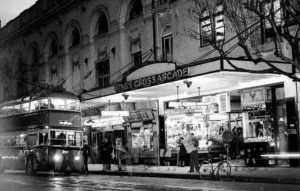Karl’s career as an activist began at age ten.
Following Anna Trapp’s death, he was abruptly moved to a farm-based Lutheran children’s home (Rettungshaus Marienberg Kinderheim), two kilometers outside the small village of Schwarzenbach an der Saale, in Upper Franconia, Bavaria. The “rescue” home was established in 1853 to cater for vulnerable and socially disadvantaged children from all over Bavaria. In 1958, there were lots of orphans in Bavaria who needed housing.

Karl’s adult career involved union activism and office-bearing in the Australian Labor Party. We often discussed union politics. So, in our conversations following his death, I can easily evoke “activist Karl” and bless his distinctive Giveaway.
Karl’s unique “activist” qualities
As I reflect on Karl’s unique activist qualities (street smarts, eyes-in-the-back-of-his-head, suspiciousness, skepticism, discernment, astuteness, and curiosity), I begin to see a path forward for my new activism.
“What would Karl do here?”
It is easy to imagine a reply to my question, “What would Karl do here?”
Karl’s friends love his kindness, gentleness, patience, and listening skills, and I know, from our conversations, that he feels that he was kind and helped people (one of his humble aims). I also know that during his life, he embodied his Giveaway in other, less poetic ways. Karl’s unique version of activist skulduggery (he was a bit of a ratbag) lives on in my heart.
THE ORIGINS OF Karl’s Giveaway
I also know things about the origins of Karl’s Giveaway that others do not (and that his family pretty much denies). I’d often comment on his “structure-hunger”: how he needs each day to proceed predictably: the same cup, the same spoon, the same seat in the same café, the same newspapers, the crossword, playing dominoes with the same friends, and so forth.
After his death and my move away from Nimbin, Karl opens up to me about the painful legacy of his childhood:
Now that you’ve been so uprooted (though Rose made your landing in Brisbane soft), you can see why I needed so much structure. I was uprooted and then virtually “incarcerated” at age ten. I had to deal with the structure of the orphanage; I could not fight it.
That “incarcerated” Karl is an obvious candidate for an activist life.
A FAILURE AT a life of crime
Karl’s early life also made him a promising candidate for still another life. In his twenties, he briefly experiments with being a petty criminal in Kings Cross, Sydney, in the 1970s. But he is too disorganized (he blames his ADHD) and gets into scraps with the Mafia over what sounds like territorial battles in the Kings Cross sex trade. Karl has a large, deep scar on one leg (that looks like a rope burn) from being dragged behind a car by some infuriated Mafiosi. (Tourists rescued him; otherwise, you would not be reading this book.)

An undistinguished military career
Before that time, as a reluctant recruit, Karl absconds from the Australian Army after being drafted. Then he decides that a military prison is the safest place to escape back to when things get too hot in Kings Cross. He spends a short stint in the brig in Queensland (where he polishes his cooking skills) before being dishonorably discharged. After that, Karl gives Sydney a wide berth for many decades. Although he never returns to a life of crime, he fits in quickly in tough neighbourhoods, and I notice on several occasions how local people seemed to recognize him as one of them.
Social activism as a social work student, Sydney University, 1997-1999
In the late 1990s, Karl, then a social work student at the University of Sydney, undertakes a student placement in a Kings Cross activist organization run by the eminent Jesuit priest, human rights lawyer and activist, Fr. Frank Brennan SJ. Fortunately, Karl’s former rivals and partners-in-crime have long since disappeared from Kings Cross, and he seems to make peace with that place and that part of his life. Karl, then 50, undertakes another social work placement with the late Professor Tony Vinson AM, an Australian academic, one of Australia’s leading social scientists and outspoken public intellectuals. Karl and Tony co-author an article about surveillance and public freedom (“Bugged by Little Brother,” Sydney Morning Herald, 17 December 1997: 17).
